
156 Results

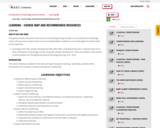
How to Use this GuideThis guide provides information and resources on teaching learning concepts in an Introduction to Psychology course. All resources are Open Access and can be downloaded or added to a Course Management System (LMS) via the hyperlinks.According to the TAG, Lifespan Development falls within Pillar 3 (Development) and is a required topic for all Ohio Introduction to Psychology courses, along with Lifespan Development. These two chapters meet the APA recommendations for Strengthening General Psychology (Gurung, et al., 2016).IntroductionThis section introduces students to the basic principles that govern learning. Specifically, students will be introduced to the concepts of classical and operant conditioning.
- Subject:
- Psychology
- Material Type:
- Module
- Author:
- OER Librarian
- Date Added:
- 05/07/2021

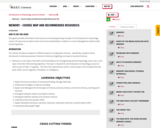
How to Use this GuideThis guide provides information and resources on teaching learning concepts in an Introduction to Psychology course. All resources are Open Access and can be downloaded or added to a Course Management System (LMS) via the hyperlinks.Introduction This section introduces students to different ways to conceptualize memory.. Specifically, students will be introduced to memory processes, theories of memory, forgetting, and ways to examine memory. Memory is a core topic in the APA’s recommendations for Strengthening General Psychology, and is also a core topic in the Ohio TAG learning objectives. This topic is required for all Introduction to Psychology courses in Ohio as part of Pillar 2: Cognitive. The Ohio TAG requirements call for a second topic to be included from this pillar, which can be Cognition, Perception, or Intelligence.
- Subject:
- Psychology
- Material Type:
- Module
- Author:
- OER Librarian
- Date Added:
- 05/07/2021

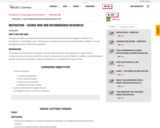
How to Use This GuideThis guide provides information and resources on introducing the field of psychology as a science in an Introduction to Psychology course. All resources are Open Access and can be downloaded or added to a Course Management System (LMS) via the hyperlinks.IntroductionThis section covers the topic of motivation. We will define motivation and explore the 4 major theories: Evolutionary, Drive Reduction, Optimum Arousal, and Maslow’s Hierarchy of Needs. In addition, we will distinguish intrinsic and extrinsic motivation. Finally, we will discuss our motivation for hunger and sex.
- Subject:
- Psychology
- Material Type:
- Module
- Author:
- OER Librarian
- Date Added:
- 05/07/2021

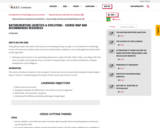
How to Use this GuideThis guide provides information and resources on teaching learning concepts in an Introduction to Psychology course. All resources are Open Access and can be downloaded or added to a Course Management System (LMS) via the hyperlinks.Although nature/nurture is not specifically addressed as a topic that falls under a Pillar, according to the TAG, these concepts can be applied across a number of required topics, such as Brain and Behavior, Lifespan Development, and Intelligence. IntroductionThis section introduces students to the concepts of nature and nurture, and provides examples of psychological topics in which an understanding of the impact of both nature and nurture is crucial.
- Subject:
- Psychology
- Material Type:
- Module
- Author:
- OER Librarian
- Date Added:
- 05/07/2021

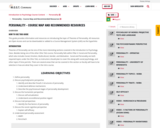
How to Use this GuideThis guide provides information and resources on introducing the topic of Theories of Personality. All resources are Open Access and can be downloaded or added to a Course Management System (LMS) via the hyperlinksIntroductionTheories of Personality can be one of the more interesting sections covered in the Introduction to Psychology Class. Besides being one of the other Ohio TAG course, Personality falls within Pillar 4: Social and Personality, which also includes Social, Emotion, Multicultural, Gender, and Motivation. Social and Personality are both required topics under the Ohio TAG, so instructors should plan to cover this along with social psychology, and other topics if time permits. There are several areas that can be covered in this section so faculty will have to be selective in how are what they cover in the Intro course.
- Subject:
- Psychology
- Material Type:
- Module
- Author:
- OER Librarian
- Date Added:
- 05/07/2021

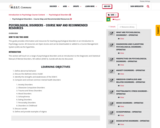
How to Use this GuideThis guide provides information and resources for teaching psychological disorders in an Introduction to Psychology course. All resources are Open Access and can be downloaded or added to a Course Management System (LMS) via the hyperlinks. IntroductionThis section will touch on a range of psychological disorders and an introduction to the Diagnostic and Statistical Manual of Mental Disorders, 5th edition (DSM-5). Suicide will also be discussed.
- Subject:
- Psychology
- Material Type:
- Module
- Author:
- OER Librarian
- Date Added:
- 05/07/2021

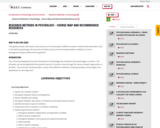
How to Use this GuideThis guide provides information and resources on introducing the different research methods that have been used in the field of psychology. All resources are Open Access and can be downloaded or added to a Course Management System (LMS) via the hyperlinks. IntroductionOne of the key takeaways from the Introduction to Psychology class should be that psychology is a science. Our discipline can be distinguished from pseudo-science or common sense through the various research approaches in the field. The instructor should provide a survey of the different methods, including examples and strengths and weaknesses to each approach.
- Subject:
- Psychology
- Material Type:
- Module
- Author:
- OER Librarian
- Date Added:
- 05/07/2021

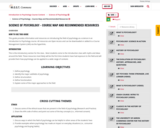
How to Use this GuideThis guide provides information and resources on introducing the field of psychology as a science in an Introduction to Psychology course. All resources are Open Access and can be downloaded or added to a Course Management System (LMS) via the hyperlinks. IntroductionThis is the introductory section for the class. Most students come to the Introduction class with myths and ideas around the field. These resources most likely will be the first time students have had exposure to the field and will provide them how psychology can be applied to a wide range of contexts
- Subject:
- Psychology
- Material Type:
- Module
- Author:
- OER Librarian
- Date Added:
- 05/07/2021

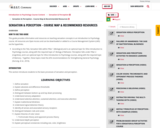
How to Use this GuideThis guide provides information and resources on teaching sensation concepts in an Introduction to Psychology course. All resources are Open Access and can be downloaded or added to a Course Management System (LMS) via the hyperlinks.According to the TAG, Sensation falls within Pillar 1 (Biological) and is an optional topic for Ohio Introduction to Psychology courses, along with the required topic of Biology of Behavior. Perception falls under Pillar 2 (Cognitive), and is an optional topic for Ohio Introduction to Psychology courses, along with the required topic of Memory. Together, these topics meet the APA recommendations for Strengthening General Psychology (Gurung, et al., 2016).IntroductionThis section introduces students to the basic processes of sensation and perception.
- Subject:
- Psychology
- Material Type:
- Module
- Author:
- OER Librarian
- Date Added:
- 05/07/2021

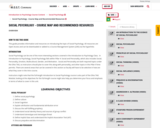
How to Use this GuideThis guide provides information and resources on introducing the topic of Social Psychology. All resources are Open Access and can be downloaded or added to a Course Management System (LMS) via the hyperlinksIntroductionSocial Psychology can be one of the more interesting sections covered in the Introduction to Psychology Class. In Introduction to Psychology, Social Psychology falls within Pillar 4: Social and Personality, which also includes Social, Personality, Emotion, Multicultural, Gender, and Motivation. Social and Personality are both required topics under the Ohio TAG, so instructors should plan to cover this along with personality, and other topics in this Pillar if time permits. There are several areas that can be covered in this section so faculty will have to be selective in how are what they cover in the Intro course. Instructors might note that the full-length Introduction to Social Psychology course is also part of the Ohio TAG Module; looking at the objectives for the full-length course might also help you determine your focus and emphasis in terms of what to cover in this unit.
- Subject:
- Psychology
- Material Type:
- Module
- Author:
- OER Librarian
- Date Added:
- 05/07/2021